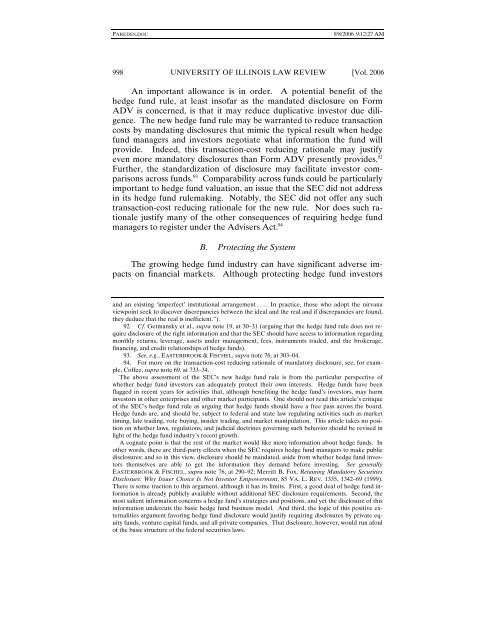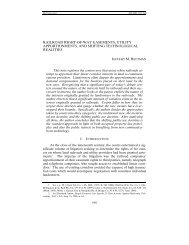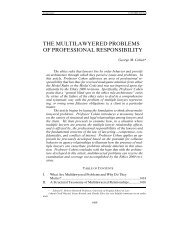on the decision to regulate hedge funds - University of Illinois Law ...
on the decision to regulate hedge funds - University of Illinois Law ...
on the decision to regulate hedge funds - University of Illinois Law ...
You also want an ePaper? Increase the reach of your titles
YUMPU automatically turns print PDFs into web optimized ePapers that Google loves.
PAREDES.DOC<br />
9/8/2006 9:12:27 AM<br />
998 UNIVERSITY OF ILLINOIS LAW REVIEW [Vol. 2006<br />
An important allowance is in order. A potential benefit <strong>of</strong> <strong>the</strong><br />
<strong>hedge</strong> fund rule, at least ins<strong>of</strong>ar as <strong>the</strong> mandated disclosure <strong>on</strong> Form<br />
ADV is c<strong>on</strong>cerned, is that it may reduce duplicative inves<strong>to</strong>r due diligence.<br />
The new <strong>hedge</strong> fund rule may be warranted <strong>to</strong> reduce transacti<strong>on</strong><br />
costs by mandating disclosures that mimic <strong>the</strong> typical result when <strong>hedge</strong><br />
fund managers and inves<strong>to</strong>rs negotiate what informati<strong>on</strong> <strong>the</strong> fund will<br />
provide. Indeed, this transacti<strong>on</strong>-cost reducing rati<strong>on</strong>ale may justify<br />
even more manda<strong>to</strong>ry disclosures than Form ADV presently provides. 92<br />
Fur<strong>the</strong>r, <strong>the</strong> standardizati<strong>on</strong> <strong>of</strong> disclosure may facilitate inves<strong>to</strong>r comparis<strong>on</strong>s<br />
across <strong>funds</strong>. 93 Comparability across <strong>funds</strong> could be particularly<br />
important <strong>to</strong> <strong>hedge</strong> fund valuati<strong>on</strong>, an issue that <strong>the</strong> SEC did not address<br />
in its <strong>hedge</strong> fund rulemaking. Notably, <strong>the</strong> SEC did not <strong>of</strong>fer any such<br />
transacti<strong>on</strong>-cost reducing rati<strong>on</strong>ale for <strong>the</strong> new rule. Nor does such rati<strong>on</strong>ale<br />
justify many <strong>of</strong> <strong>the</strong> o<strong>the</strong>r c<strong>on</strong>sequences <strong>of</strong> requiring <strong>hedge</strong> fund<br />
managers <strong>to</strong> register under <strong>the</strong> Advisers Act. 94<br />
B. Protecting <strong>the</strong> System<br />
The growing <strong>hedge</strong> fund industry can have significant adverse impacts<br />
<strong>on</strong> financial markets. Although protecting <strong>hedge</strong> fund inves<strong>to</strong>rs<br />
and an existing ‘imperfect’ instituti<strong>on</strong>al arrangement . . . . In practice, those who adopt <strong>the</strong> nirvana<br />
viewpoint seek <strong>to</strong> discover discrepancies between <strong>the</strong> ideal and <strong>the</strong> real and if discrepancies are found,<br />
<strong>the</strong>y deduce that <strong>the</strong> real is inefficient.”).<br />
92. Cf. Getmansky et al., supra note 19, at 30–31 (arguing that <strong>the</strong> <strong>hedge</strong> fund rule does not require<br />
disclosure <strong>of</strong> <strong>the</strong> right informati<strong>on</strong> and that <strong>the</strong> SEC should have access <strong>to</strong> informati<strong>on</strong> regarding<br />
m<strong>on</strong>thly returns, leverage, assets under management, fees, instruments traded, and <strong>the</strong> brokerage,<br />
financing, and credit relati<strong>on</strong>ships <strong>of</strong> <strong>hedge</strong> <strong>funds</strong>).<br />
93. See, e.g., EASTERBROOK & FISCHEL, supra note 76, at 303–04.<br />
94. For more <strong>on</strong> <strong>the</strong> transacti<strong>on</strong>-cost reducing rati<strong>on</strong>ale <strong>of</strong> manda<strong>to</strong>ry disclosure, see, for example,<br />
C<strong>of</strong>fee, supra note 69, at 733–34.<br />
The above assessment <strong>of</strong> <strong>the</strong> SEC’s new <strong>hedge</strong> fund rule is from <strong>the</strong> particular perspective <strong>of</strong><br />
whe<strong>the</strong>r <strong>hedge</strong> fund inves<strong>to</strong>rs can adequately protect <strong>the</strong>ir own interests. Hedge <strong>funds</strong> have been<br />
flagged in recent years for activities that, although benefiting <strong>the</strong> <strong>hedge</strong> fund’s inves<strong>to</strong>rs, may harm<br />
inves<strong>to</strong>rs in o<strong>the</strong>r enterprises and o<strong>the</strong>r market participants. One should not read this article’s critique<br />
<strong>of</strong> <strong>the</strong> SEC’s <strong>hedge</strong> fund rule as arguing that <strong>hedge</strong> <strong>funds</strong> should have a free pass across <strong>the</strong> board.<br />
Hedge <strong>funds</strong> are, and should be, subject <strong>to</strong> federal and state law regulating activities such as market<br />
timing, late trading, vote buying, insider trading, and market manipulati<strong>on</strong>. This article takes no positi<strong>on</strong><br />
<strong>on</strong> whe<strong>the</strong>r laws, regulati<strong>on</strong>s, and judicial doctrines governing such behavior should be revised in<br />
light <strong>of</strong> <strong>the</strong> <strong>hedge</strong> fund industry’s recent growth.<br />
A cognate point is that <strong>the</strong> rest <strong>of</strong> <strong>the</strong> market would like more informati<strong>on</strong> about <strong>hedge</strong> <strong>funds</strong>. In<br />
o<strong>the</strong>r words, <strong>the</strong>re are third-party effects when <strong>the</strong> SEC requires <strong>hedge</strong> fund managers <strong>to</strong> make public<br />
disclosures; and so in this view, disclosure should be mandated, aside from whe<strong>the</strong>r <strong>hedge</strong> fund inves<strong>to</strong>rs<br />
<strong>the</strong>mselves are able <strong>to</strong> get <strong>the</strong> informati<strong>on</strong> <strong>the</strong>y demand before investing. See generally<br />
EASTERBROOK & FISCHEL, supra note 76, at 290–92; Merritt B. Fox, Retaining Manda<strong>to</strong>ry Securities<br />
Disclosure: Why Issuer Choice Is Not Inves<strong>to</strong>r Empowerment, 85 VA. L. REV. 1335, 1342–69 (1999).<br />
There is some tracti<strong>on</strong> <strong>to</strong> this argument, although it has its limits. First, a good deal <strong>of</strong> <strong>hedge</strong> fund informati<strong>on</strong><br />
is already publicly available without additi<strong>on</strong>al SEC disclosure requirements. Sec<strong>on</strong>d, <strong>the</strong><br />
most salient informati<strong>on</strong> c<strong>on</strong>cerns a <strong>hedge</strong> fund’s strategies and positi<strong>on</strong>s, and yet <strong>the</strong> disclosure <strong>of</strong> this<br />
informati<strong>on</strong> undercuts <strong>the</strong> basic <strong>hedge</strong> fund business model. And third, <strong>the</strong> logic <strong>of</strong> this positive externalities<br />
argument favoring <strong>hedge</strong> fund disclosure would justify requiring disclosures by private equity<br />
<strong>funds</strong>, venture capital <strong>funds</strong>, and all private companies. That disclosure, however, would run afoul<br />
<strong>of</strong> <strong>the</strong> basic structure <strong>of</strong> <strong>the</strong> federal securities laws.




